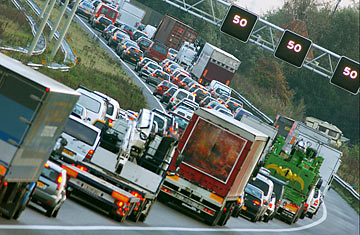
A highway in the Netherlands is congested.
Traffic jams are infuriating wherever you are, but in the Netherlands, they are the source of particular angst. Not only is the densely populated country home to Europe's most congested metropolitan region — the area called the Randstad that incorporates Amsterdam, Rotterdam, Utrecht and The Hague — but many Dutch people live below sea level, making them more than a little nervous about carbon emissions, global warming and the possibility that their country could soon be underwater.
No wonder then that the Dutch government is trying something revolutionary to reduce the number of cars on the road — taxing every motorist who gets behind the wheel based on the distance of their trip and the kind of car they drive. The plan, which was approved by the Dutch cabinet in November and is expected to be implemented in 2012, aims to eventually cut the number of traffic jams in the country in half.
Here's how it works: every car owner will be required to purchase a GPS machine that is able to send data tracking the distances of trips to a billing agency. Any motorist caught without the device will be fined. People driving a standard family sedan will be charged 3 euro cents per kilometer in 2012, with the tax going up every year until 2018, when it is expected to top out at an average of 6.7 cents per kilometer. So, for instance, a trip from Amsterdam to Eindhoven and back — a distance of about 250 kilometers — will cost the driver of a standard sedan about €7.5 ($10.75) in 2012. Rates will be higher during rush hour and for people who drive gas-guzzlers instead of fuel-efficient models. All the revenue will go toward improving road and rail infrastructure.
According to Traffic Minister Camiel Eurlings, the hope is that commuters faced with paying a hefty tax on their driving will opt to start carpooling or riding bicycles to work, and may, in the long term, even move to live closer to their jobs. "The goal is a different manner of paying for mobility that is more fair," Eurlings says. "Not paying more, but paying differently, with a positive income effect for most households."
Naturally, the plan is not without its critics. The environmental group Friends of the Earth says it will do little to reduce traffic, since driving, for the most part, will still be cheaper than using public transport, even on long trips. And some transport experts argue that road improvement projects — such as building better links connecting the main highways that crisscross the country — would be more effective at reducing congestion. "It's not simply about using cars and roads less, but about using them better," says Christophe Nicodème, head of the European Union Road Federation (ERF).
Being that this is eco-conscious Holland, however, there hasn't been a huge outcry from motorists over the proposal — everyone agrees that something needs to be done to ease the country's overloaded road network. The Netherlands may be known overseas for its cycling culture, but outside the country's city centers, gridlock is the more dreary reality. Vehicle use has risen sharply over the years, but road capacity has yet to catch up — in part due to lack of space. Previous attempts to reduce traffic — from offering incentives to people who carpool to giving away free croissants and newspapers on public transport — have had little effect. The government estimates that a typical rush hour has about 270 kilometers of traffic jams, although the GPS maker TomTom often records up to 1,000 kilometers of back-ups during peak hours.
Holland is certainly not alone with this problem. Authorities around the world have experimented for years with measures to deal with increased congestion, including creating dedicated lanes for carpoolers, reversing the flow of traffic on roads during rush hours and varying speed limits depending on traffic and weather. Cities such as London, Rome and Stockholm have started charging drivers a daily fee to enter "congestion zones" in their centers. In the U.S., states like Oregon, California and Massachusetts have mulled levying highway taxes based on the amount of mileage people drive. But the Dutch scheme is by far the most ambitious in the world because it will not only be implemented nationwide, but it also involves technology in the solution like never before.
The plan is being watched closely in countries like Germany and Belgium, where officials are also weighing creative policies to slash carbon emissions. If it succeeds, it could usher in a wave of "smart" charges on roads across the continent. If it doesn't, the Netherlands may have to brace itself for a road rage epidemic.
